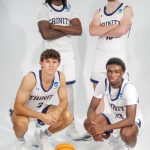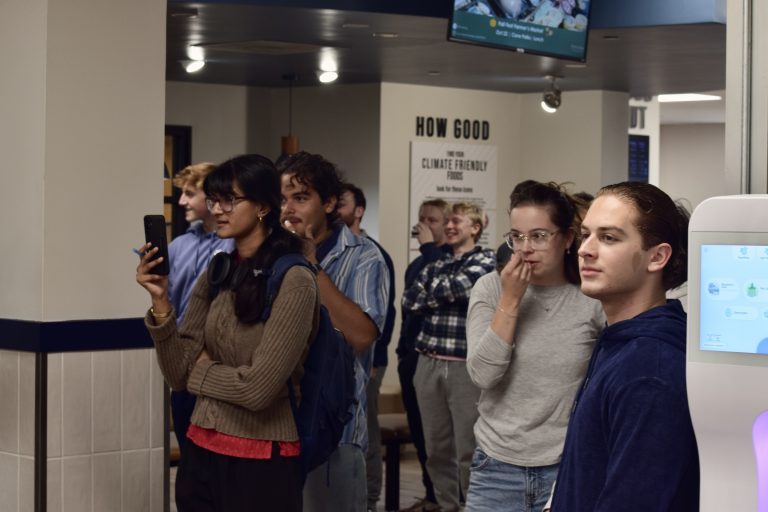Kat Namon ’22
Managing Editor
The significant coronavirus case increase at Trinity has prompted a Tripod review of Trinity’s contact tracing protocols and an examination of student living conditions in the Doonesbury dormitory, where positive-case students remain in isolation in order to limit the spread of the virus across campus. The Tripod has also learned additional details concerning how the College is approaching and evaluating the significant uptick in cases in relation to operations and precautions.
There are presently 13 students in isolation, the Tripod has learned, with a possible fourteenth following an increase in the positive case count to 15 when the College’s COVID-19 dashboard was updated Monday evening. The increase of nine cases reported over two days early last week appears to qualify as an outbreak under the Centers for Disease Control (CDC) recommended definition issued earlier this year. That guidance specifies that an outbreak has occurred when “two or more contacts are identified as having active COVID-19, regardless of their assigned priority” or when “two or more patients with COVID-19 are discovered to be linked, and the linkage is established outside of a case investigation and contact tracing.”
At least two cases last week were related to students residing in the first floor of the Jones dormitory, according to an email from Dean of Campus Life and Vice President for Student Affairs Joe DiChristina to impacted students on Tuesday, Sept. 15, suggesting a linkage. The CDC does, however, indicate that an outbreak is “relative to the local context.” It remains unclear if the 40 students in isolation for possible contact, identified in an email from DiChristina on Sept. 16, remain in quarantine.
Chief of Staff and Associate Vice President for External Affairs Jason Rojas indicated that the College’s “Hartford Healthcare infectious disease specialist” does not consider the cases last week an outbreak and instead defined them as “an uptick in cases.” Rojas went on to clarify that “with efforts to isolate and quarantine students, our focus is to limit further transmission.”
Following this uptick, the College did not rescind its guidance on student gathering last week, electing to allow students to gather in groups of six outdoors. The Tripod inquired about what factors the College is considering in deciding whether or not to permit outdoor gatherings. Rojas indicated that “testing has given us, with some degree of certainty, a sense of what we should do from a public health perspective.” Because of rigorous testing procedures, the administration believes “that it was allowable, at this moment, for very small groups to gather outside. People wearing masks and physically distancing outdoors in very small groups appears to be one way that students can socialize in a safe manner.” Rojas cautioned, however, that this privilege could “change at any moment, depending on whether conditions improve or worsen.” As of Monday evening, the College’s alert level remains at yellow.
Investigating the Contact Tracing and Relocation Process:
For any student who tests positive, Trinity has advised them to “return to your residence and stay there with your mask on until a healthcare professional or on-call campus staff member contacts you.” Students are encouraged to “begin to pack necessary belongings” in preparation for moving to Doonesbury. Student dormitory rooms are then sanitized by the College. Impacted students can walk to the dormitory or may elect to be driven by a nurse.
Trinity’s Health Center informs professors about positive results and that students will be participating in classes remotely during the duration of their quarantine. The Tripod has reached out to Director of Student Health Services Martha O’Brien for a comment and has not received a response but will update if one is received. DiChristina, however, told the Tripod that students are first “advised to contact staff for support,” which includes “staff in the Counseling and Wellness Center and the Health Center.”
Students who test positive also receive notice from contact tracers. The College’s guidance indicates that the tracer asks for a list of names of individuals “with whom you have been in close contact for the two days prior to the collection date of your positive test.” According to multiple students who tested positive, however, contact tracers only ask students to name those they had been in close contact with while indoors and not wearing a mask. This informs contact tracers of who the positive individuals had put at a medium-to-high risk but does not inform them of those that they encountered outdoors or in classes and other activates where masks were worn.
Those with possible exposure are advised to quarantine in their dormitories and are “contacted by the College’s State of Connecticut Department of Public Health trained contact tracers based on reports of direct exposure, assessments for mask-use and social distancing, among other factors, to determine who is at risk,” according to Rojas. Individuals who are not in contact with a known case “are not contacted because they are not at risk from the known positive case,” Rojas continued.
Examining the Quarantine and Isolation Experience for Positive Cases at Trinity:
The Tripod spoke with students who are in isolation, who have indicated that meals have been small in size in comparison to those for non-isolated students, with deliveries occurring at noon and in the early evening. Students have also identified concerns with support in quarantine and supervision of the Doonesbury facility.
DiChristina commented that the College ensured that “the space was cleaned, AC units [were] put in each room, the kitchen was ready as a place for us to bring food, and we set plans for cleaning the area each day.” He clarified that all these precautions were taken “within the guidelines of CDC” [sic] and that “protocols are followed by the ABM staff for cleaning.” Doonesbury is able to house as many as 31 students but, according to Rojas, the College has “secured additional facilities if needed.” As of Sept. 21, at least 13 students were in isolation in Doonesbury.
Individuals who are residing in Doonesbury for a ten-day isolation period receive meals “twice daily…between 12:30 and 1:00 p.m…and from 5:45-6:15 p.m.” Breakfast is delivered with the evening meal delivery. In an email, Residential Learning Coordinator Joel Copperthite cautioned students to only take their designated bags, as otherwise they will “be depriving another resident of their meal.” DiChristina did add that the College can “certainly can let one of the staff in student life know of any concerns” relative to dissatisfaction with the College’s policies.
Students are quarantined across three singles, which are connected by two different doors. Groups of three infected students share the same bathroom, according to reports from students who have tested positive.
The College appears to permit infected students to engage food delivery services such as UberEats and DoorDash. Students who test positive, according to a Sept. 21 email from Cooperthite, are asked to “let us know if you intend on ordering food or not prior to the day’s deliveries” to avoid waste in the delivery of College meals. That same email encouraged students to “be sure to order contactless delivery only.” It did not appear that the College was utilizing Campus Safety or any other individuals to monitor or enforce that contactless requirement. The Tripod reached out to Copperthite for a comment and has not received a response at the time of publication but will update accordingly if one is received.
Students also expressed that Doonesbury lacks regular supervision and monitoring of its interior facilities. Students do receive daily calls with members of the faculty and healthcare professionals who evaluate how they are feeling “every few hours.” According to DiChristina, there is a full-time nurse available who “is on campus but not living in Doonesbury.” He stressed that the College “wanted to be sure to have the type of coverage of needed” and that “Campus Safety can access the nurse at all hours to coordinate any responses needed.” However, while nurses are available, students have been encouraged to contact emergency services in the case of a medical emergency.
DiChristina told the Tripod that he and Dean of Student Life Jody Goodman are aware that “this is a stressful situation for our students,” adding that they “want to be attentive to their needs” as much as possible.








+ There are no comments
Add yours